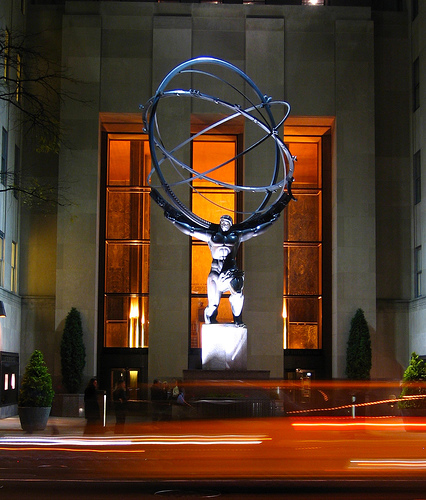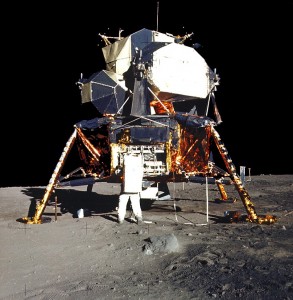Human Interest
Ayn Rand world: science research

In the Ayn Rand world, government would fund science work only for military projects. Ayn Rand herself said so, even as she praised Apollo XI. But abstract scientific research could still go on. And certain modern projects show how.
Ayn Rand on “pure” science
Ayn Rand emphasized that government should not involve itself in science work “for the sake of science.” She would never accept the idea that certain kinds of science cannot flourish unless the government patronizes it. But more than that, she feared that any science that the government did, it would pervert toward a tyrannical end.
In Atlas Shrugged, one of the most despicable and pathetic villains she created is Robert Stadler, PhD. Dr. Stadler breaks new ground in theoretical physics, and then suggests that the government should finance the kind of research he and others did. He reasoned that no business tycoon, “mogul,” or investor would ever take an active interest in “pure” science. But, said Ayn Rand, he has a problem:
[T]here is no such thing as “non-practical knowledge,” nor any sort of “disinterested action.”
So some one will profit in some way from any sort of work. Why doesn’t Dr. Stadler see that? A former student charges that he
scorn[s] the use of [his] science for the purpose and profit of life.
What does he do instead? He
deliver[s] [his] science to the service of death, to the only practical purpose it can ever have for looters: to inventing weapons of coercion and destruction.
Specifically, the State Science Institute, which he nominally directs, uses the groundbreaking principle he discovers to build an awesome and terrifying weapon: Project X, or the Xylophone. This is a battery of sonic cannons that can pulverize any person, animal, or inanimate object at a range of a hundred miles. In one of the last scenes of the novel, Dr. Stadler tries to seize command of the Project as his society collapses around him. But someone else “beats him to the punch,” and the two men fight over the controls and trigger the Xylophone. They kill each other, the crew, and thousands of people in several cities in the upper Midwest. Osama bin Laden would surely envy that scene. And so would Reinhard Heydrich and Ernst Kaltenbrunner, the two Obergruppenführeren and chiefs of the Reichssicherheitshauptamt (RSHA, or State Security High Office of the SS).
Checkered history of government science
No one has tried to build Project X or anything like it. But the United States does have a sad record of misguided scientific experiments. In the Tuskegee Experiment, the United States Public Health Service experimented with syphilis on 600 black men without telling them all the risks. At least 128 men died that way between 1932 and 1972. The shock and outrage from that story still linger. (Furthermore, one of Ayn Rand’s colleagues commented directly on it.) That might explain why many still believe that the United States government, among other things,
- Experiments on its own military service members, with highly dubious vaccines against anthrax and other communicable diseases, and
- Wages chemical warfare on its own people, by deploying aerial poisons from the exhausts of commercial airliners.
What about the space program?

Astronaut Edwin H. Aldrin, Jr. unpacks experiments from the descent stage of the Lunar Module of Apollo XI. Photo: Astronaut Neil A. Armstrong/NASA
Outer-space research is one of the most ironic stories about government funding of “pure science” in the USA, Europe, and elsewhere. For one thing, it is one of the least expensive line items in the budgets of the countries involved. But politicians of all stripes still begrudge every dollar (or euro, or yen, or ruble, but not necessarily every yuan) that any government spends on space. As Actor Hal Holbrook says in the 1977 motion picture Capricorn One:
Is it really worth twenty billion to go to another planet? What about cancer? What about the slums? How much does it cost? How much does any dream cost!?
Aside from the lurid plot of that film, most people have forgotten, if they ever learned, several key facts about Projects Mercury, Gemini, and Apollo in the United States. The United States ran Project Mercury to show that they, like the Soviets, could easily build a low-earth-orbit strategic bomber. When President John F. Kennedy negotiated the first nuclear test ban treaty with the Soviet Union, Project Mercury was far less urgent. But its successor projects, Gemini and Apollo, went on. Why? Because by then the projects had their own constituency. They also had a new motive: to build a modern “wonder of the world.”
Project Apollo eventually died, because American taxpayers did ask “how much it costs” and what they got for it. True enough, those who worked on the project invented many other devices and concepts that we use today. But no one can prove that Project Apollo alone prompted these things, or brought them to development, and then to market, any faster.
The shuttle program succeeded to Project Apollo. While it ran, it was the only way to live heavy cargoes into space. But the program, with its flawed design concept and aging equipment, couldn’t last forever, either. And now that it has folded, private companies have started to build space services of their own.
Private enterprise in space
No one disputes the value of Earth-orbital space as a type of “real estate.” But for many years, government program existed, and offered to lift cargoes at a below-cost discount. No private entrepreneur could hope to see a return on investment against a “competitor” that sold its services at such losses. That is why no private space-lift industry yet exists. The Boeing Group briefly developed its Sea Launch system, to launch cargoes from a ship sailing along the Equator. But that venture almost died from lack of customers.
Those customers have no government program to go to anymore. That might have saved Sea Launch. But Sea Launch is not the only venture. Consider:
- The X Prize, and its one proved success, Virgin Galactic. (The X Prize Foundation cites Charles A. Lindbergh’s prize-winning trans-Atlantic solo flight as a precedent.)
- The International Space Elevator Consortium, a rival foundation trying to spur development of a “skyhook” to lift cargoes into orbit at comfortable speeds.
No one would have predicted either during Project Apollo. But Ayn Rand came close. She always said that if anyone could make a profit on any human action, he would find a way to make it work and pay without breaking the bank.
The Ayn Rand model for pure research
In Atlas Shrugged, Ayn Rand did more than show how government funding of science can go horribly wrong. She showed how an “abstract scientist” could make his science pay.
Any business investor or tycoon, or any engineer, would take an interest in advancing even abstract science. He would see how he could make an abstract discovery pay concrete dividends. So the same character who condemns Dr. Stadler for “deliver[ing] [his] science to the service of death,” finds a way to make his own science pay. He builds his own laboratory, runs his own experimental program, and gives lectures, for a fee, to interested businessmen and engineers.
In one sense, this character imitates Thomas Edison. Like him, he runs his own laboratory and sells inventions to keep it up. But in another respect he surpasses Edison. In an ideal Ayn Rand world, Edison would pay him for the first right to see what he discovers.
This shows the most important thing that Ayn Rand said: all science is practical. When human beings know more about how the world works, they can use what they know to make their lives, and other people’s lives, better.
So government has no need to fund “basic research.” And indeed, such funding puts human liberty in danger. The Tuskegee Experiment arguably deprived 600 men, and their families, of their liberty, by deception if not by force. The Holocaust stands today as the most horrible real-life example of government science gone wrong.
This article is part of the Ayn Rand World series.
[amazon_carousel widget_type=”ASINList” width=”500″ height=”250″ title=”” market_place=”US” shuffle_products=”True” show_border=”False” asin=”0451233263, 0452281253, 0451191153, 0452011876, 0451163931, 0451147952, 0451163087, 0451149165, 0452264863, 0452011841″ /]
Terry A. Hurlbut has been a student of politics, philosophy, and science for more than 35 years. He is a graduate of Yale College and has served as a physician-level laboratory administrator in a 250-bed community hospital. He also is a serious student of the Bible, is conversant in its two primary original languages, and has followed the creation-science movement closely since 1993.
-

 Executive4 days ago
Executive4 days agoSecret Service chief gets no solace
-

 Executive3 days ago
Executive3 days agoWaste of the Day: Louisville Taxpayers Pay Nearly $600,000 For Empty Building’s Maintenance, Security
-

 Guest Columns5 days ago
Guest Columns5 days agoFear Itself: Democrats’ Favorite Strategy Caused Their Current Chaos
-

 Executive3 days ago
Executive3 days agoWhere is Joe Biden – or Jill?
-

 Executive2 days ago
Executive2 days agoWaste of the Day: Throwback Thursday: Cities Used Crime Prevention Funds on Soccer Games, Paper Shredding
-

 Executive2 days ago
Executive2 days agoFacile and politically motivated suggestions
-

 Civilization5 days ago
Civilization5 days agoBuild Iron Dome in the United States To Prepare for Israel’s Worst Day
-

 Executive1 day ago
Executive1 day agoBiden makes farewell whisper



“The shuttle program succeeded to Project Apollo. While it ran, it was the only way to live (sic) heavy cargoes into space.”
Well no. It was the only way for America to lift heavy cargoes into space. You do know that the heaviest thing up there is the International Space Station and that its main modules went up on Proton rockets, right?
The USA is not the world. I know that over half of you don’t even have passports but, please, do try to keep up.
Enjoy your gloating now. Very soon you won’t have reason.
I wasn’t gloating, Terry: I was merely asking you to remember that there’s a world outside your borders, even if most Americans have never seen it.
Don’t add lying about yourself to your already long track record of foolishness.
That’s a rather… strange reply. I pointed out that the Shuttle was not the only way to put heavy loads into space and you seem to have got some kind of bee in your bonnet about me gloating. How odd.
Aren’t you? Do I not legitimately read between your lines a message that reads, “Now you’re going to live like the rest of us”? (From Doctor Zhivago.)
Nope. I was just pointing out that there is a “rest of us,” i.e. the 95% of the human race who’re not American. From your comment about space transport systems you appeared to have forgotten.
That’s because private industry, by and large, used the Space Shuttle only. Those other lifters you mentioned carried government cargoes only. (The Sea Launch company did use Russian land-based lifters as a backup to their primary system of launching from a ship.)
Again, wrong. US private industry mostly used the Shuttle. The Russians are quite happy to loft satellites for anyone who’ll pay, though, and European companies often use Ariane-5 heavy boosters.
Fergus is 100% correct. Furthermore, India and China also offer launch services to commercial customers. Russia is, in fact, the largest commercial launch operator on the planet by a very large margin, and many US companies do use Russian agencies to handle their launches.
Indeed, since Russia handles NASAs manned spaceflight programme, in effect the US government also uses Russian commercial launch services (Roscosmos is paid per passenger to carry NASA astronauts).
You obviously are out of your reckoning. SpaceX has now become the first true general contractor for a space launch. From loading to recovery, SpaceX did it all, with no government control, nor any involvement aside from the ISS astronauts pulling the capsule in with their crane, and the Navy sending a slow-moving aircraft to watch the capsule as it re-entered.
Terry, your comment does address any of the points made. Fergus and I were calling you on your claim that post-Apollo, the Shuttle was the only heavy lift solution available. We provided evidence that your claim was mistaken. How does your statement about Spacex being a “general contractor” address our points re: the shuttle?
The point is: those are foreign-based solutions. Americans asking foreigners to loft their satellites? Do you not see something desperately wrong with that picture?
Talk about going off on a tangent. Impressive as SpaceX is, how is it relevant to your (false) claim that private industry mostly used the Shuttle?
I was talking about American solutions only. And about the lack of American solutions following the retirement of the Shuttle. That is, until SpaceX showed how it is done.
America was never specified. Since over 95% of the global population is not American, most people would assume that if no nation is specified, then a global context is to be assumed.
Furthermore, I would question the logic of your view that US companies using foreign contractors to launch satellites is problematic. According to the Objectivist world view that you advocate, absolute free market principles must be adhered too. The most efficient provider of the service should prevail, regardless of national origin. Saying that the use of RKK Energia is “problematic” because they are Russian, if they are providing an efficient service at the best price would thus be clearly absurd in this world view.
SpaceX, meanwhile, is no paragon of private sector efficiency, since at least 50% of it’s funding comes from NASA (at least $475m, and possibly as much as $600m) and it makes extensive use of government owned facilities and expertise at way below market rates, when not gratis.
“I was talking about American solutions only.”
Fair enough, but it might have been better to state that for the benefit of the 95% of us who’re not American.
“That is, until SpaceX showed how it is done.”
Well, SpaceX can lift a 6-ton load. It’s an impressive achievement for a private company, but practically speaking it’s where NASA and the Russians were 40 years ago and it’s only useful for small satellites and supply runs. NASA’s next exciting mission, the James Webb Space Telescope, will be going up on an ESA Ariane-5 heavy booster.
“Americans asking foreigners to loft their satellites? Do you not see something desperately wrong with that picture?”
Not really; after all foreigners often used to get Americans to loft their satellites. America also gets foreigners to fly heavy loads to deployed troops (Antonov An-124 transports, for example,) provide ballistic missile early warning (Canada and the UK,) design mission systems for your new aircraft (the F-35’s self-defence systems are largely the work of BAe) and start your entire space programme (the Saturn V was designed by a former SS-Sturmbannführer.) Like everyone else, America is increasingly dependant on the rest of the world. You can’t do anything about it if you want to stay relevant.
I wonder if now if a good time to mention that Space X is founded by and run by a South African, not an American?
[…] public institutions of any kind. This includes the Post Office, “pure” science programs, Public Broadcasting Service and National Public Radio. (C-SPAN might survive as an institution of […]